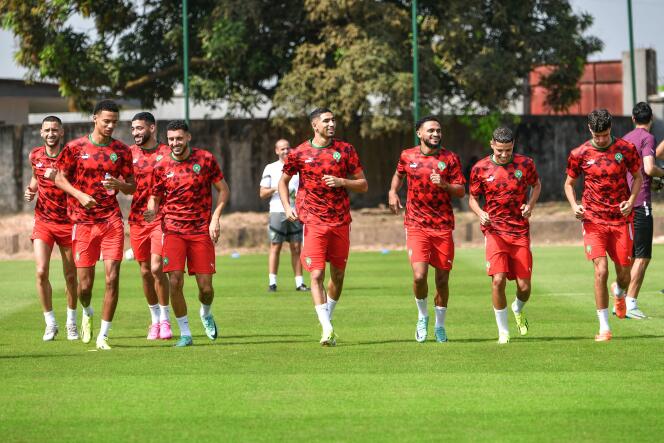


"Have you ever seen kids fighting to become goalkeepers?" Gabriel Hicham Guedira is still amazed. At the Juventus Academy, the football school he set up in Casablanca in 2018, youngsters no longer just want to score goals. "They want to look like Yassine Bounou [the Atlas Lions' goalkeeper, who plays for Saudi club Al-Hilal]," said Guedira, a former physical trainer at Grenoble Foot 38, who sees this phenomenon as an effect of the World Cup in Qatar.
Since the Moroccan national team reached the semi-finals of the competition for the first time in December 2022, this football enthusiast turned businessman has observed a new enthusiasm for positions previously little sought-after. And more broadly, a greater attraction to football, with "young people who want to give up basketball or volleyball to play with their feet".
The enthusiasm generated by the national football team has been a notable development alongside the meteoric rise of Morocco up the FIFA rankings. The team reached 11th place worldwide following its performance in Qatar, when it wasn't in the top 50 four years earlier. Forgotten are Lionel Messi and Cristiano Ronaldo, the two stars of European football who had long monopolized the love of Moroccan fans. "Today, everyone wants a Bounou or a Ziyech [striker Hakim Ziyech, who plays for Galatasaray] in the family," said sports policy researcher Moncef Lyazghi.
For the myriad training centers, academies and private football schools in the major cities, the fervor surrounding the players has seen an increase in attendance from the start of the 2023 academic year. Over the last year, "we've had 60% more registrations in our Casablanca complex and 300 more in our Bouskoura complex," said Adil Halla, vice-president of Raja, one of the two clubs in Morocco's economic capital. There are queues at the opening of registration and disappointed parents when they run out of places after just a few days. "I've never seen anything like it," said Lyazghi, whose two boys have been enrolled at the FUS school in Rabat for years.
This enthusiasm generated by the Moroccan team's results has not always been there – far from it. "We went through a long period in the desert," said journalist Amine Rahmouni, sports consultant for Moroccan public radio station 2M. "Between losing the final at the Africa Cup of Nations in 2004 and the appointment of Hervé Renard as coach in 2016, I have almost nothing but bad memories." Having won two continental titles with Zambia and Côte d'Ivoire, the current coach of the French women's football team has not won any trophies with Morocco. He has, however, helped the national team return to international competition after a number of lean years.
"Renard has reconciled us with our team, and Regragui [Walid Regragui, the Atlas Lions' coach] has made us love it," said Rahmouni, for whom the real football revolution is not to be found in the Lions' performances or in the number of fans, but rather in the new profile of supporters. "Games are no longer just between friends, but involve the whole family. The national team has even succeeded in mobilizing older women, who used to be much less interested in the game."
Because football in Morocco is no longer just a men's game. More and more girls are taking to the field. In Rabat "their number doubled in 2023," said Guedira. And it's not just the Lions and their achievements that are to credit for this increase. By reaching the final of the Women's Africa Cup of Nations in 2022, and the last 16 for the first time at the last Women's World Cup, the Atlas Lionesses have also helped "to bring Moroccan women closer to football," said Moad Oukacha.
The president of Sporting Club de Casablanca, which finished runner-up in the Women's Champions League of the Africa Cup of Nations in 2023, sees this as a success of the Marshall Plan launched in 2020 by the Moroccan football federation to develop the women's game. Since then, the budget for the women's national league has increased sevenfold, he said, the first and second divisions have been professionalized and all clubs have begun to invest massively in girls' training.
Is the democratization of football under way? "Undoubtedly, but the infrastructure is not keeping pace," said Lyazghi. In terms of all sports, there is one facility for every 30,000 of the country's inhabitants. For football, there is one for every 74,000. In addition to a disparity between regions, he pointed to an insufficient number of licensed players – "barely 80,000, fewer than 0.2% of the population". Lyazghi has pleaded for the implementation of a government strategy to create sports units and training academies "all over Morocco, not just in Rabat or Casablanca".
However, the development of grassroots football, which promotes mass participation and encourages integration, seems to be under way. "We're seeing a spectacular development of organizations and small clubs, with the multiplication of local pitches and practice that is becoming structured through real coaching and the organization of tournaments," said Fadel Abdellaoui, a former member of the Raja board of directors, who pointed out how important football has always been in Morocco "from a social point of view".
This post-Qatar euphoria is no longer confined to the turf either. Less publicized, but just as impressive, is the success of the Moroccan futsal team – a football-based game played on a hard court, and a discipline in which the country was winner of the Africa Cup of Nations in 2020, quarter-finalist at the World Cup in 2021 and Arab world champion in 2022 and 2023. Rahmouni is certain of one thing: "Morocco is living its golden age of global football."
Translation of an original article published in French on lemonde.fr; the publisher may only be liable for the French version.
